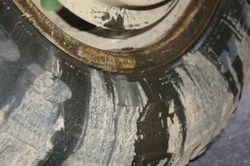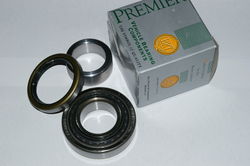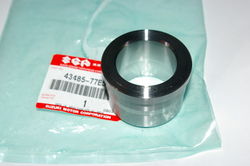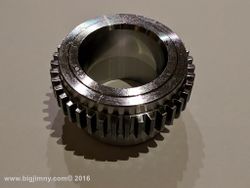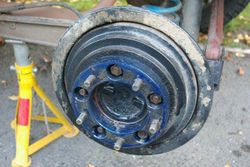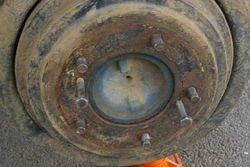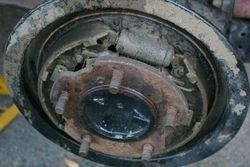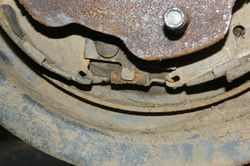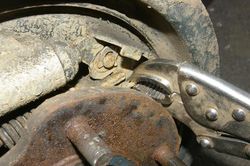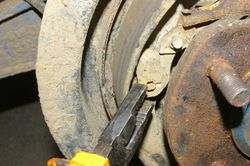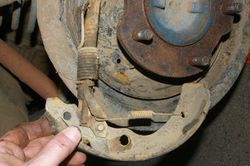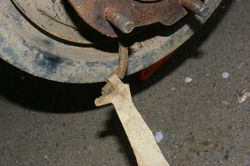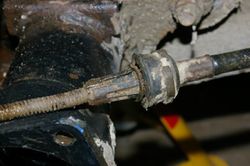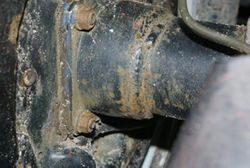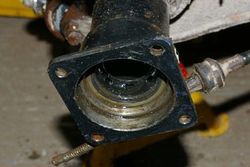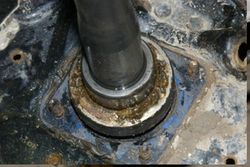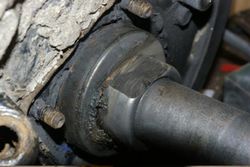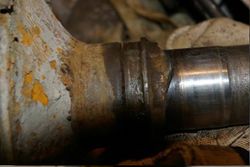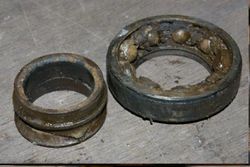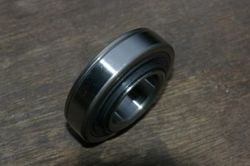Contents
Rear Wheel Bearings
Introduction
The Rear Wheel Bearings on a Jimny can be prone to wearing, particularly when used off-road. The drum brake backing plate is supposed to provide protection for the bearing but it is very poor and you can expect the bearing to fail VERY regularly. Providing you have the correct tools it can be straight forward task.
So what are the symptoms of worn Rear Wheel bearings:
- Grating/Grinding as you rotate a jacked up wheel
- Oil/Grease leaking from rear of drum
- Wheel falling off (yes, really, comes out complete with driveshaft!)
Changing the bearings
Tools
Bearing kits
You will need a suitable bearing kit for your car. Two kits are available, one for ABS and one for non-ABS cars.
The non-ABS kit has a plain retainer ring. This kit is available from a number of suppliers including the BigJimny Store. I have sold a number of different kits over the years and found the quality of the retainer ring varies with some cheap kits being very poor quality.
The ABS kit has a retainer ring with an ABS ring installed. The fitment of the kit is the same as the standard one but note that the ABS retainer is much larger overall if you were considering using the cheaper non-ABS kit. Some kits have a retainer ring with the ABS ring whilst other have the ring as an integral part.
Removing the hub
First of all secure the car, release the wheel nuts and jack up the car and remove the road wheel. This then reveals the brake drum, this has a spacer fitted to it. With all the wheel bolts removed AND THE HANDBRAKE OFF the drum can be pulled forward and off the hub.
If the drum is stuck then first of all check that the handbrake is off then insert two small bolts in the holes in the face of the drum. Reach around the back and feel near the top for a rubber bung. Remove the rubber bung and insert a flat bladed screwdriver. Angle the screwdriver so that the blade is pointing to the back of the car and the handle towards the front, you should be able to feel the adjuster wheel. Using the screwdriver turn the adjuster downwards a few clicks. Then gradually tighten the bolts you inserted in the front, the drum should come off.
With the drum removed the brake shoes can be seen (covered in mud in this case!). As the hub has to come off to change the bearings you need to remove the brake assembly.
Removing the shoes
Use a small pair of pliers and remove the small spring that connects across the base of the brake shoes.
Use a pair of molegrips to remove the strong spring that joins the top of the shoes with the adjuster. Make a careful note of how the adjuster is fitted, the rod has a forked end and on part of the fork has a step in it. Make careful note of how this fork is fitted.
Use a pair of pliers and twist the end of the shoe retaining pin until the spring clip it released
Now the shoes will lift away. Take care not to loose the little adjuster arm and its small spring.
Release the end of the handbrake cable from the arm on the shoe.
The handbrake cable is held into the brake backing plate by an expanding spring clip around the cable. The clip needs to be squeezed so the cable can be pulled out complete with the clip. This is not easy to do but will come out with persistence.
NO PICTURE.
You then need to remove the brake pipes from the cylinder. Undo the pipes and catch the drips of brake fluid. There is one pipe if you are doing the passenger side and two pipes if you are doing the drivers side.
Removing the Hub
The hub is retained by four bolts on the rear.
PICTURE REQUIRED
The hub can now be removed. The unit is a friction fit into the axle casing. Attach a slide hammer to the hub and pull it out by using the slide hammer action. Alternatively refit the wheel or old wheel or brake drum (backwards) and hit the hub from behind to drive it off.
With the hub pulled you can then see the oil seal and oil splash protector in the axle. Hook the old seal out, clean up the axle and push the new seal supplied with the kit into place.
Removing the Bearing
The old bearing is held in place by a retainer ring which needs cutting off.
The best way seems to be to cut it away with an angle grinder. I do not know of anyone who has removed it in a different way.
With the retainer cut away you should be able to remove the remains of the bearing. As you can see in the picture, my bearing had collapsed and left the inner race on the axle .
The damage to mine is clear!
This is what a new bearing should look like. Note that it has a built in "spacer" on one edge, this should be to the OUTSIDE of the hub/wheel.
New bearing kits are available in the BigJimny store. There is also a special kit for ABS equipped cars
Re-assembly
This section needs completing but essentially it is a reverse procedure of above.

